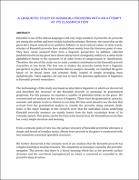| dc.description.abstract | Kiswahili is one of the African languages with very large numbers of proverbs. Its proverbs are among the earliest and most-widely studied by scholars. However, the researches on the genre have almost centred on its aesthetic, folkloric or socio-cultural values. In other words, scholars of Kiswahili proverbs have studied them mainly from the literature point of view. They have rarely analysed them from a linguistic perspective. In addition, collected published works on the genre have almost always been arranged by authors in a rather facile alphabetical format to the exclusion of all other forms of categorization or classification.
Therefore, the aim of this study was to make a modest contribution to the Kiswahili proverb researches at two levels. The first was to analyse the proverbs mainly from a linguistic perspective, in place of the more familiar literary analysis. Secondly, we classified the genre based on its lexical items and semantic fields, instead of simply arranging them alphabetically. Taken together, the aim was to show the potential application of linguistics in Kiswaili proverb researchers.
The methodology of this study was based on descriptive linguistics in which we discovered and described the structure of the Kiswahili proverb, in particular its grammatical properties. For this purpose, we examine a umber of published works on the genre. We concentrated our analysis on four areas of linguists. These were the grammatical, syntactic, semantic and stylistic levels in relation to our data. We then went ahead to use the data that accrued from the grammatical analysis to classify the proverbs along semantic fields.
Some of the major findings of this research were that the individual words underlying Kiswahili proverbs sentence are mainly drawn from the basic vocabulary items of its everyday speech. This points out the fact that at the lexical level, the Kiswahili proverb often has a very simple structure and meaning.
From a syntactic point of view too, the surface structure of Kiswahili proverbial utterance is simple and devoid of complex syntax. Almost every proverb in the genre is constructed with two immediate consistent (parallel) structures.
We further discovered at the semantic level of our analysis that the Kiswahili proverb has complex meaning at its deep structure. The complexity in meaning is caused by the proverbs' metaphor. This proves that there is a literal meaning which lies at the proverbs surface structure and the non-literal (metaphorical) on which is conceived or concealed in the proverb’s deep structure.
There is also variation in the types of metaphor in Kiswahili proverbial sentences. This means some proverbial constructions contain more complex metaphors than others. Apparently, the chief function of metaphor in the proverb is the creation of ambiguity, at its sentence’s deep structure. Unlike the ambiguity that is likely to be found in everyday Kiswahili, which may either be lexical or structural, the ambiguity in its proverbs stems from the metaphor in its sentence.
For this reason, virtually every Kiswahili proverb contains some form of metaphorical ambiguity. It appears that the main function of metaphorical ambiguity in Kiswahili proverbs is to compensate for the often restricted syntax of its sentence, in addition to creating multiplicity of meaning or usage.
Perhaps, one of the distinguishing linguistic characteristics of the Kiswahili genre that we found in the study is its high content of end-rhyming proverbs. This feature is largely attributed to the vowel-ending nature of its works which makes the feature easily achievable in the language as a whole. | en_US |

